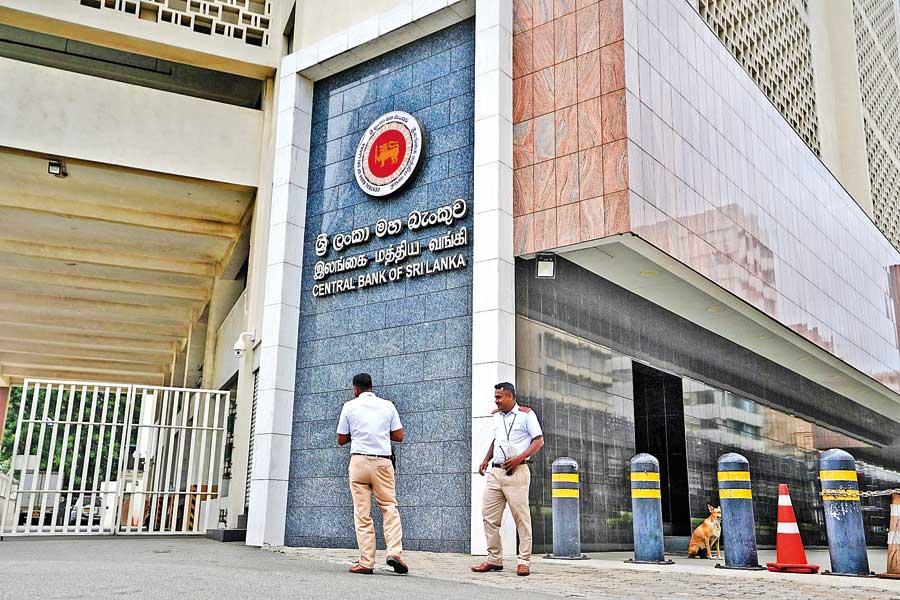04 Oct 2023 - {{hitsCtrl.values.hits}}

The small and medium enterprise (SME) sector is still suffering as a result of the turmoil caused by the sudden and drastic increase in policy rates that triggered the abnormal increase in interest rates in April 2022. The results of this action can still be seen in the contraction of Sri Lanka’s growth rate by 11.5 percent in the first quarter of 2023 compared to the first quarter of 2022.
interest rates in April 2022. The results of this action can still be seen in the contraction of Sri Lanka’s growth rate by 11.5 percent in the first quarter of 2023 compared to the first quarter of 2022.
Many still argue that the sudden increase and the quantum of increase were not warranted to bring down inflation that was caused by supply-side factors. The depreciation of the exchange rate, supply disruptions caused by post-Covid-19 issues and Russia-Ukraine war fuelled inflation. Food inflation was the main reason for the overall increase. It was not an increase in demand.
In this regard, I would like to quote from an interview with Yannis Stournaras, who is Governor of Greece’s Central Bank and is also a member of the Governing Council of the European Central Bank. He was asked: “In terms of using the tool of raising interest rates to bring down inflation, do you think it is working?” His reply was: “It is working. Not as good as compared to a case where it would have been a demand-led inflation.”
Further on in the interview, he goes on to say monetary policy is not the only instrument to control inflation. “We need fiscal policy. We cannot increase interest rates and at the same time have governments expand fiscally. So, we need a helping hand from fiscal policy and also structural policy.”
Sadly the Central Bank’s decision to increase interest rates caused havoc amongst the SMEs, those employed by these SMEs and those living below the poverty line. What could have been done was to make drastic cuts in government expenditure; even though it would have been painful for some, use monetary policy more cautiously and save the economy.
Damage controlling
Having said this, we should now look at the damage control we can do to revive the economy. The SMEs being the backbone of our economy that generates employment to over 45 percent of our working population, need more than a helping hand to raise their heads again.
In addition to generating employment and reducing Sri Lanka’s poverty levels that have deteriorated in the recent past, reviving the SME sector will also reduce non-performing loans in the financial sector and increase our growth rate. The SMEs that could not service their loans due to the unbearable interest rates in 2022 and the first half of 2023, will be able to start repaying their loans, if there is a sufficient reduction in interest rates.
Even though the Central Bank should be commended for having instructed the banks to bring down the interest rates a few weeks ago, the Central Bank’s instructions were not adequate to bring down the rates to a level that could encourage the SMEs to recommence business with the huge overdue loans and overdrafts that they ran up last year. Just like the Central Bank used interest rates to shrink the economy and bring down inflation, we are hopeful that the Central Bank will now use interest rates to revive the economy.
Over 90 percent of the deposits in commercial banks and National Savings Bank are being repriced at the lower interest rates, which the banks were very quick to implement from the second quarter of this year. However, the bankers are now using the argument that there is an opportunity cost to bringing down the interest rates when high rates are offered for Treasury bills (T-bills).
We are well aware that high rates have to be accepted to mobilise funds for the government to pay government salaries and support state enterprises that have cash flow problems. If adequate measures are implemented to bring down the government borrowing and reduce T-bill rates, commercial banks will be compelled to offer decent interest rates, in order to maintain their loan books. We are of the view that a sizable reduction in T-bill rates to single-digit levels will bring a corresponding drop in lending rates of commercial banks. T-bill and Treasury bond rates can be reduced only if the government requirement to fund a deficit of income over expenditure can be achieved.
At last Wednesday’s media briefing, Peter Breuer, Senior Mission Chief for Sri Lanka at the International Monetary Fund’s (IMF) Asia and Pacific Department, emphasised on the gap between revenue and expenditure. He stated that the Sri Lankan government revenue was 9 percent of GDP and expenditure was 19 percent of GDP.
What the IMF needs is for Sri Lanka to make its debt sustainable. This can be done by either increasing revenue or reducing expenditure. Considering the tax increases that have already been done, there is not much room to increase taxes any further. However, there is still room for much improvement in tax collection, particularly from high-income sources.
The Central Bank has identified the domestic interest expenses and expenditure on government salaries as the two main items of the government’s recurrent expenditure. These two items alone amounted to 113.5 percent of government revenue in 2022. Whilst the Domestic Debt Optimisation (DDO) will reduce the domestic interest expenses to some extent, reducing the government salary bill needs to be addressed as a matter of urgency.
At a recent speech, the Secretary to the Treasury spoke of circulars issued by the Treasury to control government spending. Whilst these are commendable steps taken to control government expenditure, the real saving will come only if attention is paid to reduce the salary and overtime bill of government institutions.
Sri Lanka presently has a very unproductive and bloated government service, with one government servant for every 15 persons, compared to Japan having one government servant for every 40 persons. During the last budget debate, Eran Wickremaratne drew attention to this fact, even at the expense of his popularity. Wickremaratne must be commended for bringing this up in Parliament.
India, being a country with similar culture and values as Sri Lanka, has 125 persons per government servant, as per the last census done in 2011. The report issued by the Indian Ministry of Labour and Employment Directorate General of Employment and Training Survey and Study Division in April 2014 after this census states, “It may be observed that there had been constantly rise in the Central Government employment till 1995 and thereafter declining trend has been noticed.”
If India can reduce its government servants, why can’t we? If we are not in a position to meet the IMF targets relating to the percentage of tax to GDP, we can achieve the objective of making our debt sustainable by reducing government expenditure.
We appreciate that fiscal consolidation does not fall within the Central Bank’s purview. However, being in one of the strongest positions to influence decision makers on this subject, we are disappointed that the Central Bank is not making adequate effort in this regard.
Expediting divestment
Even though the government states that it has set about restructuring and divesting selected state-owned enterprises (SOEs), progress in this regard seem to be slow. Whilst the introduction of competitors for fuel distribution is an encouraging development, we hope this will be followed up soon with the next stage of restructuring/divestment. We suggest that a transparent mechanism such as an offer for sale through the Colombo Stock Exchange be adopted when divesting government shareholdings of listed SOEs.
What is most important is expediting the divestment process that will help reduce the T-bill and Treasury bond stock. Here too we appreciate the Central Bank’s inability to take a direct role. However, we are of the view that the Central Bank is in a very influential position to have this expedited, especially by drawing attention to the effect the increase in interest rates had on the economy.
With all the foregoing measures, which are not new to the government and Central Bank, being available, we urge the Central Bank to take quick action to bring down interest rates to single-digit levels and save our SME sector to prevent a further worsening of our economy.
(Tania Abeysundara is Chairperson of Sri Lanka United National Businesses Alliance (SLUNBA)
29 Oct 2024 29 Oct 2024
29 Oct 2024 29 Oct 2024
29 Oct 2024 29 Oct 2024
29 Oct 2024 29 Oct 2024
29 Oct 2024 29 Oct 2024